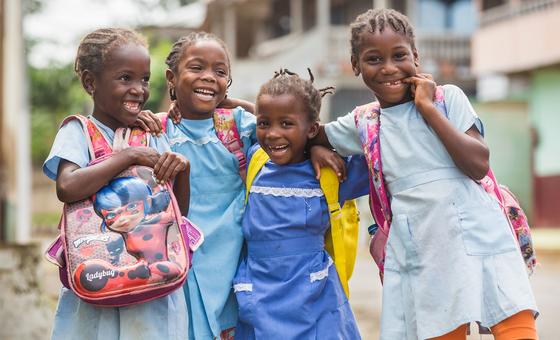São Tomé and Príncipe is due to graduate from its current status as one of the world’s Least Developed Countries (LDCs), a journey that is testament to its economic successes, but is not without challenges, as Eric Overvest, the senior UN official in the country, tells UN News.
There are currently 46 LDCs listed by the UN and countries graduate once they have reached certain development targets.

Eric Overvest: São Tomé and Príncipe is doing well in terms of social indicators, such as GDP per capita, but is lagging in others, such as the Economic Vulnerability Index, and that’s where the UN provides a lot of support because it’s the health of the economy that will allow the country to graduate from its LDC status.
For example, we’ve helping the country to market itself as a place that sells organic, high-end products. So, instead of just exporting cocoa beans, they’re exporting chocolate bars. Organic palm oil, coconut oil, and vanilla pepper are also being sold.
Finding the resources to adapt to the climate crisis is also very important, and we’ve been supporting the government’s efforts to find more funding for the protection of biodiversity, and preserve marine resources. This country is moving towards the use of renewable energies; the UN supported the country’s first solar park, which opened last year, and solar panels are going up on schools and health centres.
We’re also helping to develop the private sector; promoting a form of ecotourism that’s integrated into the culture and history of the country, and supporting small and medium sized enterprises.
UN News: What challenges could hold Sao Tome back even after graduation, and how does the UN plan to deal with that?
Eric Overvest: I would say it’s a mentality shift, from the idea of being dependent on foreign aid, towards a model where you are generating the resources for your own economy, making sure you have the sources of growth to sustain your social protection system, to sustain the social sectors, and to make sure that your country can accelerate towards the achievement of the UN Sustainable Development Goals.

In São Tomé and Príncipe, WFP supports some families displaced by climate change
It’s about assuming your development challenges and looking ahead and seeing what we can do as a country to move ahead. So, it puts a lot of pressure on the country to make sure they are ready for graduation.
Linked to that is the migration challenge. Many are still looking for opportunities abroad, but the human resources needed to support the development process are needed in the country.
A particular challenge for São Tomé and Príncipe, and other Small Island Developing States, is the vulnerability of the islands to the climate crisis, because we have seen floods, hurricane and storms, which can have a very disruptive impact on the economy. In December 2021, around seven per cent of GDP was lost to damage caused by heavy rainfall.

A mother helps her son with his homework at home in São Tomé and Príncipe.
UN News: What advice would you give to the leaders of Least Developed Countries to help them achieve economic development and poverty reduction?
Eric Overvest: Invest more heavily in the economy and the sectors of growth where you have the competitive advantages, where you can add value, and where you can create more jobs.
You need to analyse your weaknesses and strength, and that develop a national development plan. And that requires commitment at the highest level, political commitment to invest in those economic sectors where you really see the future growth of the country.
I’ve seen it here in São Tomé and Príncipe. There is a real shift towards more private sector involvement, and towards agriculture that is not just based on exporting raw materials. LDCs need to find their niche and develop it for future growth.
Eric Overvest is the UN Resident Coordinator in São Tomé and Príncipe. He was talking to UN News at LDC5, a major UN conference, held in Doha, Qatar from 5-9 March 2023.
LDCs and graduation
-
The category of least developed countries was established in 1971 by the UN General Assembly. It was created to attract special international support for the most vulnerable and disadvantaged members of the United Nations.
-
Graduation from the Least Developed Country (LDC) category is a key milestone in the sustainable development progress of a country and requires support from all its stakeholders.
-
Challenges arise as the country stands to lose LDC-specific benefits and favourable arrangements. However, the impact of the loss of such benefits depends on how effectively the country had been using those benefits before graduation.
-
São Tomé and Príncipe is scheduled to graduate on 13 December 2024.
-
Six countries have previously graduated from LDC status: Botswana (in 1994), Cape Verde (2007), Maldives (2011), Samoa (2014), Equatorial Guinea (2017), and Vanuatu (2020).

